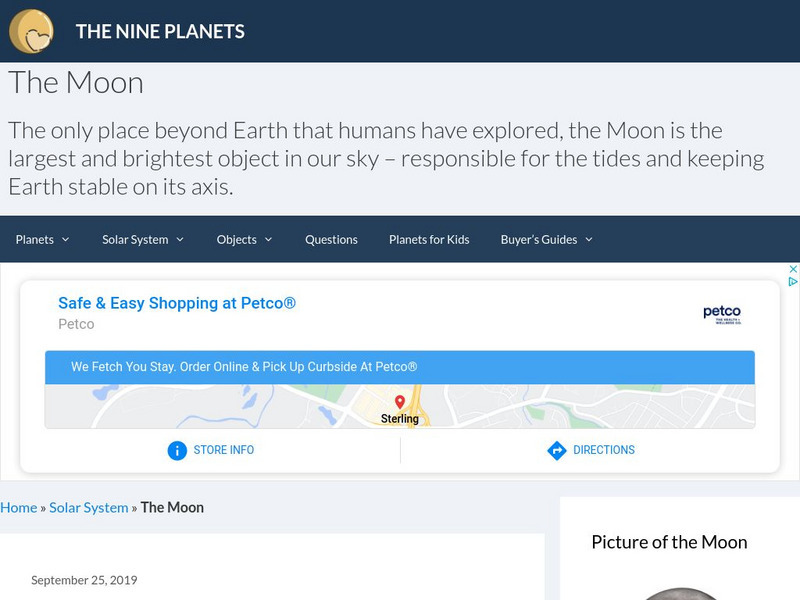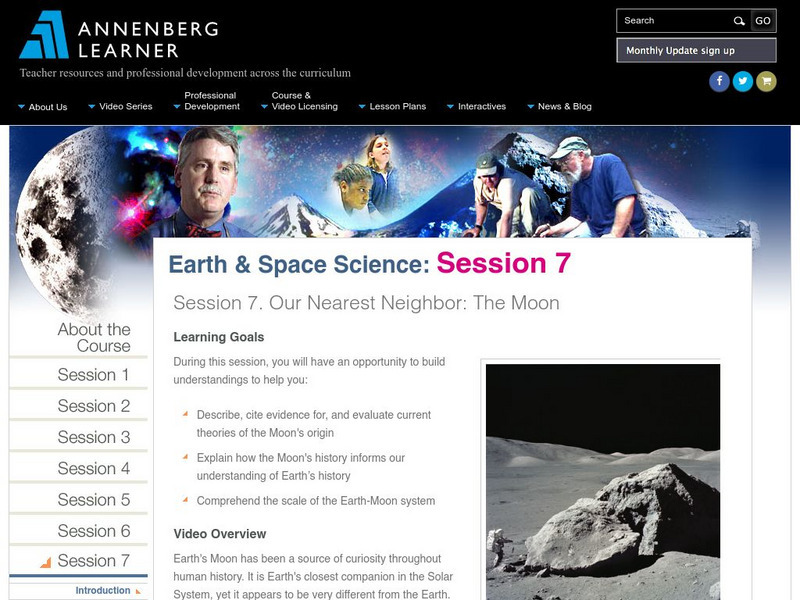Curated OER
Exploring the Planets
Sixth graders explore the planets through an interactive web site. In this astronomy based lesson, 6th graders compare planets, explore comets, and discover planet facts through a variety of activities provided by the Smithsonian Museum.
Curated OER
Good Heavens
Students look at the history of science to identify some of the scientific ideas that different cultures have contributed to science throughout history. They describe using examples ideas developed by different cultures to explain the...
Curated OER
Brain POP - Eclipse
In this eclipse instructional activity, learners answer 7 fill in the blank questions, 4 matching questions, and complete a timeline table with.
Curated OER
Jupiter - King of the Planets
In this Jupiter activity, students read a passage about the environment and atmosphere of Jupiter. Students then answer several multiple choice questions about the passage.
Curated OER
Satellites
Eighth graders explore the history of space travel and satellites. Through a teacher demonstration, 8th graders observe how a satellite revolves another object. They identify natural and artificial satellites, explore how satellites...
Curated OER
A Flag for Mars
Young scholars investigate the historical use of flags on Earth, debate ownership issues for interplanetary exploration, and design a flag for Mars. The implication of placing a flag at a location forms the focus of the lesson plan.
Curated OER
Weather Myths
Fourth graders relate myths to weather phenomenon. They write and illustrated a weather myth and present it to the class.
Curated OER
Motion Through the Ages
Eighth graders conduct internet research to produce a timeline of man's growth in understanding of concepts of motion and planetary motion through history.
Curated OER
Nazis Flying Saucers – Film Sparks UFO Debate
Students explore the aircraft used in World War II. In this World History lesson, students read an article that describes a "flying saucer" created by the Nazi's. Upon completion of the reading, students answer questions on the article,...
Curated OER
Influential Scientists Vocabulary Multiple Choice Worksheet
In this science vocabulary worksheet, students read the names of science professionals. From three choices, students choose the correct definition for each word.
TLS Books
Uranus
After reading an informational text passage, learners answer four multiple choice questions about the third largest planet in our solar system.
Curated OER
Influential Scientists Vocabulary Multiple Choice Worksheet
In this influential scientists worksheet, students read the definitions of 19 science professions. From 4 choices, students choose the correct name of the job that fits the definition. Example: studies birds (ornithologist).
Curated OER
Knowledge Quiz: The Universe
In this universe quiz learning exercise, students complete a set of 10 multiple choice questions that cover a variety of concepts about the universe: constellations, black holes, the solar system, etc.
Curated OER
Mixed Prepositions 13
In this prepositions online interactive worksheet, students choose the multiple choice preposition in 10 drop down boxes that completes each sentence grammatically correct. Students check their answers online when completed.
Curated OER
Who Am I? Famous Scientists
In this scientists worksheet, students read a brief synopsis of a scientist, then try to identify the person, 12 total. Worksheet contains links to additional activities.
Other
Planetary Society: Relative and Absolute Ages in Histories of Earth and the Moon
A lengthy scholarly article that discusses the geologic time scale, its history of development, age-dating events that occurred in different eras, and how absolute and relative dating are used to assess the ages of the Earth and Moon....
Nine Planets
The Nine Planets: Earth Facts
Find lots of information about our planet Earth here. Covers basic facts, Earth's history, layers of the Earth, plate tectonics, composition of the atmosphere, Earth's magnetic field, and some facts about our moon.
Nine Planets
The Nine Planets: The Moon
Explore the mythology, structure, observational history, gravitational force, and orbit of Earth's Moon.
Khan Academy
Khan Academy: Codex Leicester: Fossils/mountains, Moon/tides
An excerpt from Leonardo da Vinci's Codex Leicester. Find out how this "Renaissance man" observed the Earth and learned more about tides, moons, and fossils in the mountains.
Annenberg Foundation
Annenberg Learner: Earth and Space Science: The Geologic Timeline
Take this online quiz and test your knowledge of geological history, and the formation of our atmosphere, water, crust, oxygen, tectonic plates, Moon, and the rest of the Earth.
Annenberg Foundation
Annenberg Learner: Earth and Space Science: Our Nearest Neighbor: The Moon
Material to begin an exploration of the Moon, theories about its origin, and its history's relationship to our Earth's history. An hour-long video is accompanied by learning goals, an outline and overview, details on the Moon's movement,...
Other
Historic Wings: "One Small Step" Race to the Moon
"One Small Step, The Race To The Moon" is a clear presentation of the story of the Moon landing program that the United States conducted during the 1960's and early 1970's. After launching the presentation click on the phases of the Moon...
Science Struck
Science Struck: How Was the Earth Created
This resource gives a detailed explanation of the stages that the Earth and the solar system went through beginning with their origins in the Big Bang up to the present time.
American Museum of Natural History
American Museum of Natural History: Ology: Astronomy: In Pictures: Beyond Planet Earth
What would it be like to travel across the solar system and explore space? Take a look at some of the places that humans might go to someday, and the questions that scientists are asking.





















